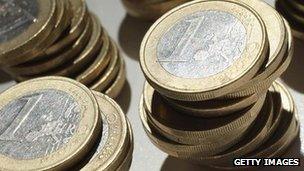Spain bond yields jump above 6%, raising bailout fears
- Published

The cost of borrowing for Spain has jumped above 6%, raising again the prospect of a bailout.
The yield on Spain's 10-year bonds reached 6.1%, ahead of auctions of debt on Tuesday and Thursday that could be increasingly expensive for Spain.
The nation's cost of borrowing has been rising steadily over the past four months.
Investors have been worried by data showing Spain's banks are entirely dependent on emergency ECB loans.
The yield suggests that if Spain wanted to borrow for 10 years today, it would pay more than 6%.
In comparison, the yield on 10-year bonds from Germany, the eurozone's strongest economy, is 1.73%.
Recession
Spain is suffering from a deep economic slump brought about by a bust in its property and construction markets.
Unemployment is the highest in Europe, with a record 4.75 million out of work. Half of Spain's under-25s are unemployed.
The Bank of Spain said recently that the county's economy contracted in the first quarter of the year - but it did not say by how much. The economy shrank by 0.3% in the three months to December, so this additional contraction implies that Spain's economy is in recession.
The country's economy minister said on Monday that in the first three months of the year the country had probably contracted by as much as the last quarter of 2011 again, but added this was actually better than expected.
"If you had asked me two months ago, I would have expected the first quarter of 2012 to be much worse than the last quarter of last year," Luis de Guindos told the El Mundo newspaper.
"But that's not going to be the case."
Too reliant?
On Friday, the Bank of Spain - the central bank - said its net lending to its banks in March had risen to 228bn euros ($298bn; £188bn), up from 152bn euros a month earlier.
The big jump was mainly due to a second auction of three-year emergency loans carried out by the European Central Bank, which has given 1tn euros to banks since December.
This money was intended to be lent by the ECB to national central banks, which is turn lent to commercial banks who would buy their country's debts and bring borrowing costs down.
While this happened initially, investors are afraid of just how much the Spanish banks are relying on cheap ECB loans to stay afloat.
Since 2010, Greece has been bailed out twice and the Republic of Ireland and Portugal also needed bailouts to stay afloat.